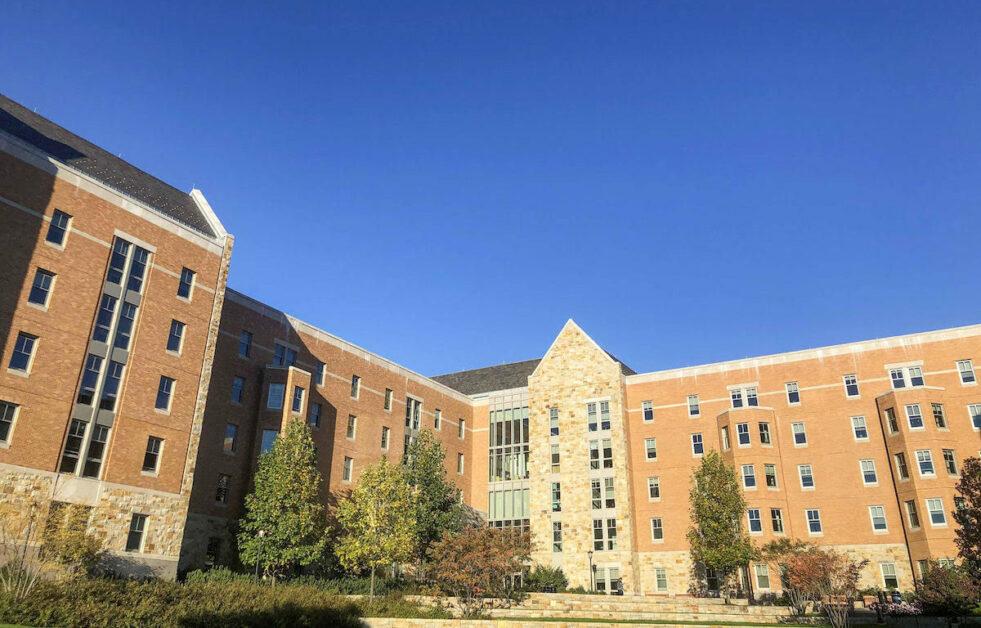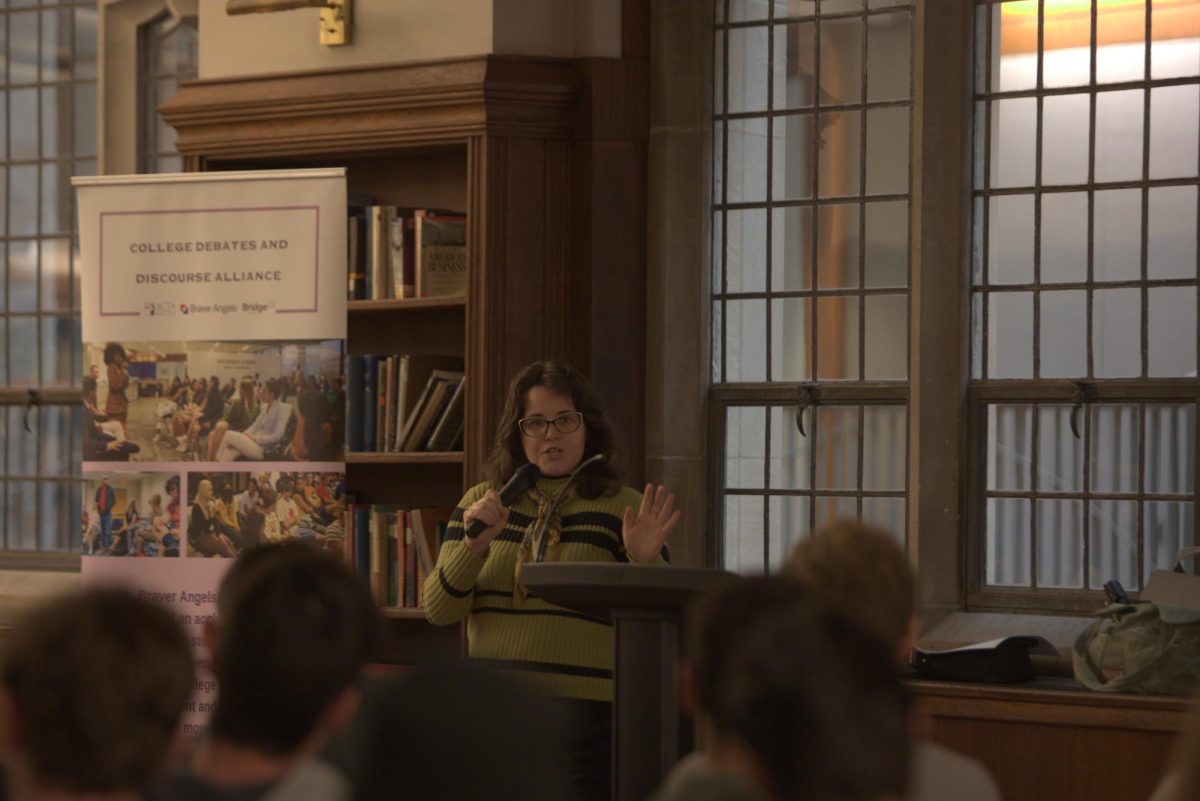“I registered us Monday morning, … and lo and behold we got a pick time,” Wolther, MCAS ’24 said.
During housing registration on March 15, multiple freshman and sophomore groups of six successfully registered to live in that residence hall—known among students as 2150—which typically serves as senior housing. Worther and sophomore Gleni Garnett were both left stunned by their eventual housing selections.
“It was kind of shocking, like I was kind of in disbelief,” Garnett, CSON ’23, said. “I was like, ‘No way this is this easy.’”
Traditionally, more than 90 percent of seniors live on campus, according to the Office of Residential Life website. But this year, ResLife saw a drop in the number of eligible rising seniors choosing to live on campus for the next academic year, with approximately 81 percent signing up for housing selection for the next academic year, wrote Greg Jones, director of housing operations, in an email to The Heights.
Quinn Kiernan, MCAS ’22, is among the group of students who opted to live off campus for senior year.
“I love just the idea of like, you know, like a house kitchen, not a dorm kitchen,” Kiernan said. “Like I said, a yard. I love candles. I love having candles out. So just things like that—just more freedom.”
This freedom, Kiernan said, partly comes in the form of him and his roommates being able to enforce their own restrictions to mitigate the risk of COVID-19.
“We preferred this quality of life, I guess, just having our own restrictions that we can put in place, not having to worry about all of like, you know, just living in a dorm with hundreds of people,” Kiernan said.
Patrick McGoldrick, a junior living in an off-campus apartment on Chestnut Hill Avenue, said his group of six originally tried to select a Mod for housing for next year. But with a later pick time, the group was subjected to its second choice, Ignacio Hall.
“It was good, I wasn’t disappointed,” McGoldrick, MCAS ’22, said. “ … I mean, I knew either way it was gonna be alright.”
McGoldrick said living on campus comes with the benefit of proximity to friends, classes, and sporting events. But also, he said living on the Heights also comes with added supervision.
“There’s the RAs and rules for parties and all that stuff that you have to deal with, but in my freshman and sophomore years there’s never really [been] too much of an issue,” McGoldrick said. “So I’m not, I wouldn’t say I’m disillusioned by the idea of supervision.”
Garnett, who also acknowledged that living on campus comes with more restrictions and supervision, said that her group members predicted that they would get three collections of smaller apartments or stay in a six-person suite in Stayer, where much of the group currently lives.
“But, on the first day we were just kind of like, let’s, let’s try for 2150 just, you know, to see,” Garnett said. “Let’s try for a six-man apartment and we ended up getting it big time.”
Renzo Chunga, another freshman living in 2150 next year, planned on living in an eight-person suite in Walsh Hall or Vanderslice Hall. When he heard that his group landed in a six-person apartment, he was also caught off guard.
“So that was definitely a complete shock, especially for me because I wasn’t really, I wasn’t like the leader of the group,” Chunga, CSOM ’24, said. “I really didn’t know, you know, necessarily know the ins and outs of the whole process.”
After the initial shock, Wolther became worried, he said, as everyone in Wolther’s group feared that they would not be able to keep their six-person apartment.
“So Monday night we were all extremely nervous when we finally got it,” he said. “We were still nervous because we worried that it may have been a mistake.”
Wolther said that many other people, including a resident assistant (RA), told them it was unlikely that they were actually going to live in the apartment.
In the next few days, Wolther said his group members checked with multiple ResLife staff, from their current RAs to the resident director of 2150, Mitchell Strzepek, to confirm that they had actually secured a six-person apartment. He said all of the staff confirmed the group would be living in 2150.
With fewer seniors living on-campus, Jones said that juniors and sophomores had a better chance at landing housing typically occupied by seniors.
“The ripple effect of that means that more sophomores could end up in junior housing, and then more sophomores in suites compared to traditional style,” Jones wrote. “However, these impacts are all dependent on what students choose and who signs up. A shift in demand for one type of housing does not necessarily reflect a shift in demand for all housing.”
Jones said that more rising sophomores and juniors were able to register for housing in 2150 because fewer seniors signed up for six-person apartments.
“This year was the first time we have had these groups be able to select housing on six-person apartment day, as usually it is only our category 1 groups that receive picks for this day,” Jones wrote. “We also saw a decent number of four-person apartments in Gabelli and Voute go to current sophomores. Sometimes we may see a handful of sophomores select into these buildings, but it was definitely a higher rate this year than in years past.”
The greatest benefit of the six-person apartment—according to Garnett, Chunga, and Wolther—is the full kitchen.
“Biggest benefit of the apartment I think is going to be we can go off the meal plan,” Wolther said. “I think that’s a great option. We’re just really excited about having a kitchen. Very excited. Extremely excited.”
Keirnan, on the other hand, said that he prefers living off campus because he is guaranteed a yard and cheaper parking that any on-campus alternatives.
“Once we had like our own rooms, it was like, ‘Do we really want to go back in a dorm, not have a lawn, most likely, and live in doubles again?’” Kiernan said, “And we’re just like, ‘Probably not.’”
Kiernan also said living off campus makes him feel more connected to Boston.
“It … just makes me feel like more of an adult and not a student, which I prefer, and that I kind of exist external to BC in a way,” he said.
Kiernan admitted that living off campus does have its drawbacks, though. Long leases could tie down seniors in Boston months after they graduate, he said.
Kiernan also said he misses the excitement of housing registration by living off campus.
“I do miss that excitement of doing that,” Kiernan said. “I was a little jealous, but I’m happy with what we’re doing.”
Garnett, on the other hand, said the housing registration process can be unfair. Her housing group sophomore year was first placed in doubles in Williams Hall, which was later converted during the summer to accommodate first-years, before being moved to Greycliff Hall and then finally being placed in Stayer Hall.
“I think BC housing is so unfair and like I would be the first person to, you know, rally against that,” Garnett said.
Wolther acknowledges that getting the six-person apartment in 2150 was incredibly lucky.
“Hey, we were lucky,” Wolther said. “… I’m sorry if someone wanted to get a six-man that they didn’t get, but I can say I won’t take it for granted.”
Jones wrote in the email that a lot of factors can impact room selection, allowing groups like Wolther to secure a spot in 2150.
“This year shows that sometimes collective behaviors and preferences shift, and these changes have ripple effects with wide ranging impacts,” Jones wrote. “This year’s numbers are likely the result of the pandemic. We believe that in the 2022-2023 year, we expect to see a return to traditional housing patterns with more seniors returning to campus.”
Part of that return to traditional housing patterns would look like a return to fuller occupancy, according to Jones.
“We are hopeful that with vaccinations and continued diligence through the spring and summer, we will be able to return to a more normal year by the fall semester,” Jones said in the email. “As such, we have not made any occupancy adjustments to any of the traditionally senior buildings. We expect to be as close to 100% occupancy as possible for the fall.”
Garnett, reflecting on her housing selection experiences both as a rising sophomore and as a junior, said housing is not as big of a deal as it might seem.
“I don’t really think housing is super important in the grand scheme of things,” Garnett said. “I mean we all go to BC, like it’s a great school … I don’t think housing is going to make or break whatever experience we have.”
Update 4/4/2021 8:35 p.m.: This article has been updated to include comments from the Office of Residential Life.
Featured Image by Maddy Romance / Heights Editor













